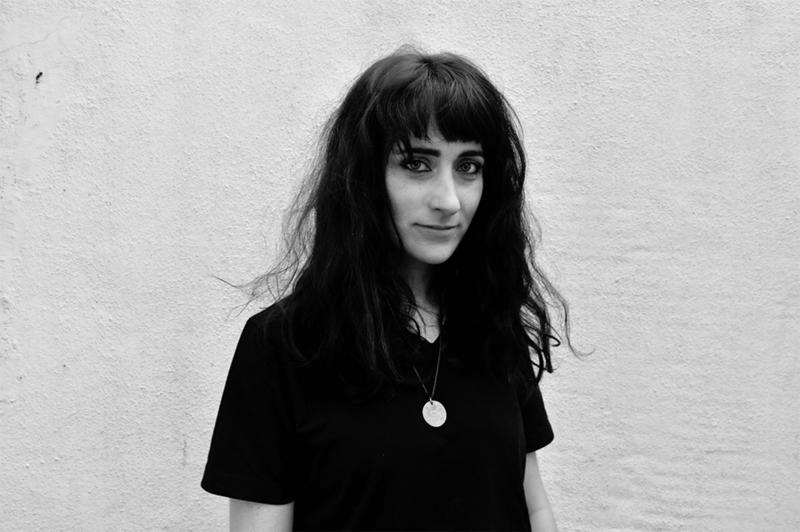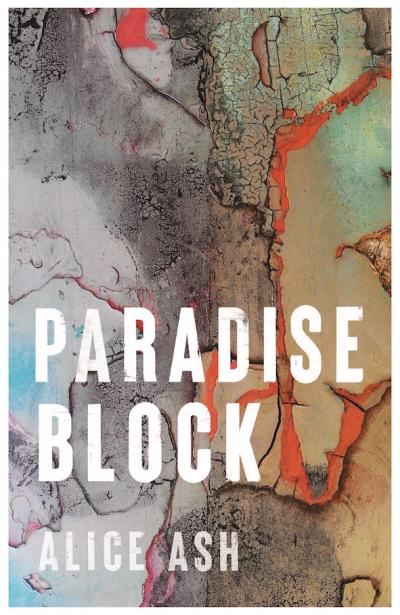Alice Ash: Paradise Block review - a matrix-like collection that reinvents the short story genre | reviews, news & interviews
Alice Ash: Paradise Block review - a matrix-like collection that reinvents the short story genre
Alice Ash: Paradise Block review - a matrix-like collection that reinvents the short story genre
Watching boundaries come undone in a surreally sinister block of flats

“Burglar alarms jangled through the empty hallways of Paradise Block.” In this ramshackle, lonely tenement, such alarms might be one’s only company. Yet, in this intricate collection of short stories, the inhabitants’ lives intertwine.
Of course, stories collated together in one place often share themes or ideas, but Ash takes this further, picking up characters and motifs from one story and scattering them throughout the rest. In “Eggs”, a young yet grown-up girl cooks endless shells for her birdlike mother and younger brother; later in the collection she resurfaces, throwing said eggs against a wall. In “Planes”, Elaine is a tacky phone sex worker whom her son is ashamed of, but she is Mr Cornflower’s lifeline in “Timespeak”. And Min in “Eggs”, an old busybody, becomes vulnerable, sensitive and slightly lost in “Sea God”. Questions unanswered by one tale are often fulfilled, offhand, in another, but the stories’ uncanny quality is not lost as a result. Rather, tension threads together these fictions like the lives of the tenants.
 Also crucial to the interlocking nature of these stories is the way that characters switch places. In “Eggs”, mother and child undergo a subtle shift that is cleverly insinuated before erupting at the story’s end. Age reversal is maintained as a trope; Benny in “Planes” is savvy beyond his 10 years when he writes to his estranged father, “I’m not a s*x pervert, at least not yet (maybe come and get me soon, though?)”. By contrast, the unnamed protagonists in “The Flea-Trap” are childlike adults who “only ever have fun”, though they have a baby of their own. In “Bad Elastic”, flatmates Marie and Shell are supposed to be saving money for Shell’s upcoming baby. In fact, spoiled, vulnerable Marie turns out to be the child who needs providing for. These tenuous, shifting connections between adulthood and childhood ensure the matrix-like structure of these stories operates on both spatial and temporal axes.
Also crucial to the interlocking nature of these stories is the way that characters switch places. In “Eggs”, mother and child undergo a subtle shift that is cleverly insinuated before erupting at the story’s end. Age reversal is maintained as a trope; Benny in “Planes” is savvy beyond his 10 years when he writes to his estranged father, “I’m not a s*x pervert, at least not yet (maybe come and get me soon, though?)”. By contrast, the unnamed protagonists in “The Flea-Trap” are childlike adults who “only ever have fun”, though they have a baby of their own. In “Bad Elastic”, flatmates Marie and Shell are supposed to be saving money for Shell’s upcoming baby. In fact, spoiled, vulnerable Marie turns out to be the child who needs providing for. These tenuous, shifting connections between adulthood and childhood ensure the matrix-like structure of these stories operates on both spatial and temporal axes.
They also evidence a difficulty in establishing fixed boundaries for the self. In “Eggs”, the italicised pronoun “She” is an attempt by the narrator to other her mother from herself, but one which fails as her mother gradually takes over everything belonging to her child. And in “You”, a woman is looking for “the one”, trying to distinguish “You” from the dating pool of “boys/guys/men”. She fails, nevertheless, to attach the pronoun to the right person. We can try to define people through grammatical order, but they slip through our grasp, spreading like the “mould as thick as fur” in Paradise Block. Relationships in this collection are never easy, though connection is constantly sought.
This world is characterised by frugality, but certain motifs repeat in this mix – the foods honey, wine, black bread and White Fingers biscuits. The colour pink is also a common presence, from the exquisite phrase “A pink cough flew out of my mouth and left a thread of mucus on my palm”, uttered by Mr Cornflower, to the “coral-coloured top and coral-coloured skirt” that signify sexual desirability in “Complaint”. And the sinister character Pinkie, with her black eyes and insatiable hunger, is spread thinly throughout the pages of Paradise Block, returning with uncanny vehemence.
Despite its interconnections, this is, however, a finite world. The site of the action, “Paradise Block, Box Close”, suggests that the supposed infinity of “paradise” is “closed” off or “boxed” in. The stories flit between locations but never extend further than Clutter or the neighbouring town of Plum Regis, hemmed in by the Lilybank River, a body also defined by its banks, its limits. As for us in lockdown, the limits of this world are tangible, forcing the lives of the tenants in Paradise Block together, but never in a way that can constitute “paradise”.
The quality of strangeness that Ash injects into everyday life is not new for the genre, and in that sense the collection is not especially fresh. What makes it strong is the way the stories interlock, characters’ lives interacting in disjointed ways. In the note at the end of the text, the new caretaker at Paradise Block finds a notebook while clearing out the flat of Mr Cornflower (now deceased). It is a poetry of conversations between Cornflower and his companion Mr Grisco, conducted on paper due to the former’s deafness, but demonstrating powerfully the uneasy meshing of lives and stories in this collection. In some strange sense, and though we might not know it, we are all in this together. It is a reminder to us that now, especially in isolation, there is a strange poetry to co-existence.
- Paradise Block by Alice Ash (Serpent's Tail, £12.99)
rating
Explore topics
Share this article
The future of Arts Journalism
You can stop theartsdesk.com closing!
We urgently need financing to survive. Our fundraising drive has thus far raised £49,000 but we need to reach £100,000 or we will be forced to close. Please contribute here: https://gofund.me/c3f6033d
And if you can forward this information to anyone who might assist, we’d be grateful.

Subscribe to theartsdesk.com
Thank you for continuing to read our work on theartsdesk.com. For unlimited access to every article in its entirety, including our archive of more than 15,000 pieces, we're asking for £5 per month or £40 per year. We feel it's a very good deal, and hope you do too.
To take a subscription now simply click here.
And if you're looking for that extra gift for a friend or family member, why not treat them to a theartsdesk.com gift subscription?
more Books
 'We are bowled over!' Thank you for your messages of love and support
Much-appreciated words of commendation from readers and the cultural community
'We are bowled over!' Thank you for your messages of love and support
Much-appreciated words of commendation from readers and the cultural community
 Robin Holloway: Music's Odyssey review - lessons in composition
Broad and idiosyncratic survey of classical music is insightful but slightly indigestible
Robin Holloway: Music's Odyssey review - lessons in composition
Broad and idiosyncratic survey of classical music is insightful but slightly indigestible
 Thomas Pynchon - Shadow Ticket review - pulp diction
Thomas Pynchon's latest (and possibly last) book is fun - for a while
Thomas Pynchon - Shadow Ticket review - pulp diction
Thomas Pynchon's latest (and possibly last) book is fun - for a while
 Justin Lewis: Into the Groove review - fun and fact-filled trip through Eighties pop
Month by month journey through a decade gives insights into ordinary people’s lives
Justin Lewis: Into the Groove review - fun and fact-filled trip through Eighties pop
Month by month journey through a decade gives insights into ordinary people’s lives
 Joanna Pocock: Greyhound review - on the road again
A writer retraces her steps to furrow a deeper path through modern America
Joanna Pocock: Greyhound review - on the road again
A writer retraces her steps to furrow a deeper path through modern America
 Mark Hussey: Mrs Dalloway - Biography of a Novel review - echoes across crises
On the centenary of the work's publication an insightful book shows its prescience
Mark Hussey: Mrs Dalloway - Biography of a Novel review - echoes across crises
On the centenary of the work's publication an insightful book shows its prescience
 Frances Wilson: Electric Spark - The Enigma of Muriel Spark review - the matter of fact
Frances Wilson employs her full artistic power to keep pace with Spark’s fantastic and fugitive life
Frances Wilson: Electric Spark - The Enigma of Muriel Spark review - the matter of fact
Frances Wilson employs her full artistic power to keep pace with Spark’s fantastic and fugitive life
 Elizabeth Alker: Everything We Do is Music review - Prokofiev goes pop
A compelling journey into a surprising musical kinship
Elizabeth Alker: Everything We Do is Music review - Prokofiev goes pop
A compelling journey into a surprising musical kinship
 Natalia Ginzburg: The City and the House review - a dying art
Dick Davis renders this analogue love-letter in polyphonic English
Natalia Ginzburg: The City and the House review - a dying art
Dick Davis renders this analogue love-letter in polyphonic English
 Tom Raworth: Cancer review - truthfulness
A 'lost' book reconfirms Raworth’s legacy as one of the great lyric poets
Tom Raworth: Cancer review - truthfulness
A 'lost' book reconfirms Raworth’s legacy as one of the great lyric poets
 Ian Leslie: John and Paul - A Love Story in Songs review - help!
Ian Leslie loses himself in amateur psychology, and fatally misreads The Beatles
Ian Leslie: John and Paul - A Love Story in Songs review - help!
Ian Leslie loses himself in amateur psychology, and fatally misreads The Beatles
 Samuel Arbesman: The Magic of Code review - the spark ages
A wide-eyed take on our digital world can’t quite dispel the dangers
Samuel Arbesman: The Magic of Code review - the spark ages
A wide-eyed take on our digital world can’t quite dispel the dangers

Add comment